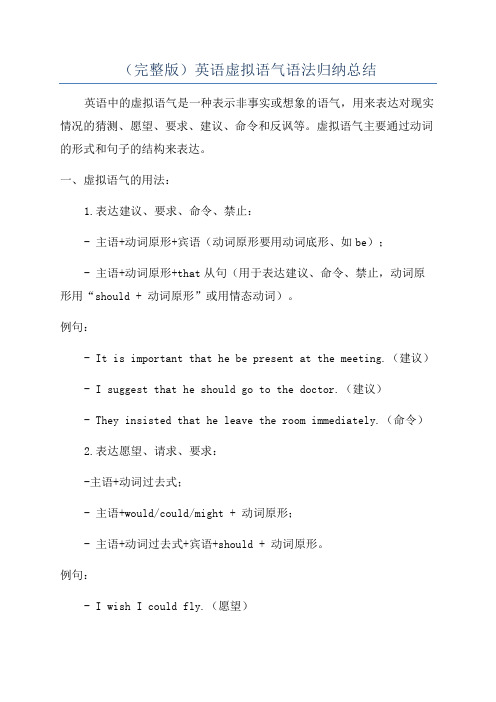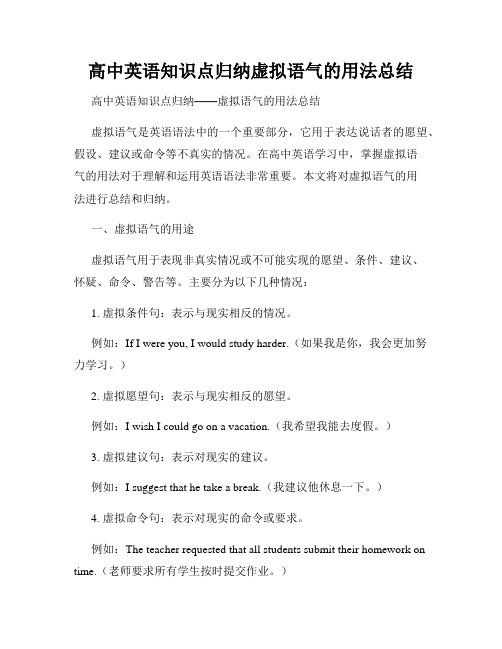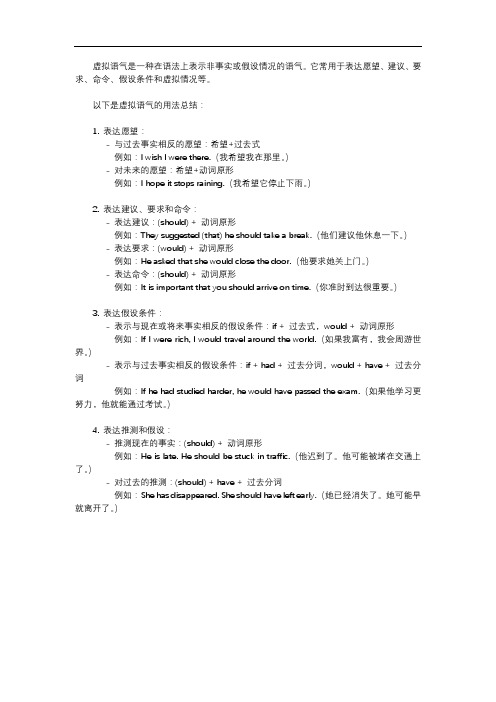虚拟语气用法总结(超好_原创)
(完整word版)虚拟语气用法详解(word文档良心出品)

虚拟语气用法详解一、条件句中的虚拟语气1. 条件句中虚拟语气的形式从句中提出一种与客观现实不相符或根本不可能存在的条件,主句会产生的一种不可能获得的结果。
条件句中的2. 条件句中的虚拟语气的举例(1) 将来时的条件句中的虚拟语气。
如:If he should go to Qing Hua University, he would make full use of his time. 如果他要上清华大学的话,他就会充分利用他的时间了。
If he were to come here, he would tell us about it. 如果他要来的话,他会通知我们一声。
(2) 现在时的条件句中的虚拟语气。
如:If he were free, he would help us. 要是他有空的话,它会帮助我们的。
If he studied at this school, he would know you well. 如果他在这所学校学习的话,它会对你很熟悉。
(3)过去时的条件句中的虚拟语气。
如:If I had seen the film, I would have told you about it. 我如果看过这场电影,我会把电影内容告诉你了。
If I had got there earlier, I would have met Mr. Li. 如果我早点到那儿,我就会会到了李先生。
3. 运用条件句中的虚拟语气时,须注意的几个问题(1)当从句的主语为第三人称单数时,谓语动词若是系动词be时,可用was 代替were。
但在倒装虚拟结构及if I were you, as it were 中,只能用were。
如:Were I ten years younger, I would study abroad. 要是我还年轻十岁的话,我会去国外学习。
If I were you, I would try my best to grasp the chance. 要是我是你的话,我要尽力抓住这次机会。
(完整)虚拟语气用法总结,推荐文档

虚拟语气的用法总结语气:语气是动词的一中形式,它表示说话人对某一行为或事情的看法和态度。
语气的种类:(1 )陈述语气表示动作或状态是现实的,确定的或符合事实的,用于陈述句,疑问句和某些感叹句。
如We are ready. What a fine day it is!(2 )祈使语气表示说话人的建议,请求,邀请,命令等。
如Ope n the door, Please.应注意以下几点:1. 主语通常是第二人称you,但多不出现,动词用原形,否定用don ot或者don'加动词原形(或be)女口Be careful next time. Don 'smoke here.2. 有时为了强调,主语也可以出现,而且可以是第三人称,谓语动词不加-s或者-es如You be quiet.He sta nd up.3. 祈使语气可以用do加强语气女口Do come to see this Sunday.4. 在Let's的祈使句后,疑问部分通常用shall we ;在Let us后,疑问部分用will you女口Let' goout for a walk after supper , shall we? /Let us clean our classroom, will you?5. 祈使句与连词and连用时相当于一个条件句,而and之后则是表示结果。
如Think hardand you will have a good idea.(3)虚拟语气表示动作或状态不是客观存在的事实,而是说话人的主观愿望,假设或推测等。
女口If I were you, I should study En glish.一. 虚拟语气在条件从句的用法条件句有两类,一类是真实条件句;一类是非真实条件句,也就是虚拟条件句。
如果假设的情况是有可能发生的,就是真实条件句,谓语要用陈述语气。
如If it doesn S rain tomorrow, we will go to the park.如果假设的情况是过去或现在都不存在的,或将来不大可能发生的,则是虚拟条件句。
(完整版)英语虚拟语气语法归纳总结

(完整版)英语虚拟语气语法归纳总结英语中的虚拟语气是一种表示非事实或想象的语气,用来表达对现实情况的猜测、愿望、要求、建议、命令和反讽等。
虚拟语气主要通过动词的形式和句子的结构来表达。
一、虚拟语气的用法:1.表达建议、要求、命令、禁止:- 主语+动词原形+宾语(动词原形要用动词底形、如be);- 主语+动词原形+that从句(用于表达建议、命令、禁止,动词原形用“should + 动词原形”或用情态动词)。
例句:- It is important that he be present at the meeting.(建议)- I suggest that he should go to the doctor.(建议)- They insisted that he leave the room immediately.(命令)2.表达愿望、请求、要求:-主语+动词过去式;- 主语+would/could/might + 动词原形;- 主语+动词过去式+宾语+should + 动词原形。
例句:- I wish I could fly.(愿望)- I would appreciate it if you could help me.(请求)3.表示虚拟条件:- If条件从句中的谓语动词用过去完成时,主句用would/should/might/could + have + 过去分词;- If条件从句中的谓语动词用过去时,主句用would/should/could + 动词原形。
例句:- If I had known his phone number, I would have called him.(虚拟条件)- If you had listened to me, we could have finished the project earlier.(虚拟条件)4.表达建议、要求、祝愿:- If only内部称述 + 主语 + 过去式。
虚拟语气的用法归纳

虚拟语气是一种特殊的动词形式,用来表达说话人的假设、愿望、猜测、建议等非现实的情况。
虚拟语气在英语中的使用非常广泛,包括情态动词、动词的过去式、过去完成时、be 型虚拟式等形式。
下面我将详细介绍虚拟语气的用法。
一、情态动词的虚拟语气1. 表示现在或将来的假设例如:If I had money, I would travel around the world.2. 表示过去的假设例如:If I had studied harder, I would have passed the exam.3. 表示与现在事实相反的愿望例如:I wish I were rich.4. 表示与过去事实相反的愿望例如:I wish I had studied harder.5. 表示与将来事实可能相反的愿望例如:I wish it would stop raining.二、动词的过去式的虚拟语气1. 表示现在或将来的假设例如:If I knew the answer, I would tell you.2. 表示过去的假设例如:If I had seen the movie, I would have recommended it to you.三、过去完成时的虚拟语气1. 表示过去的假设例如:If I had had more time, I would have finished the work.2. 表示与过去事实相反的愿望例如:I wish I had gone to the party last night.四、be型虚拟式1. 表示现在或将来的假设例如:If I were you, I would take the job.2. 表示与现在事实相反的愿望例如:I wish I were in Hawaii now.五、混合虚拟语气1. 表示过去的假设例如:If I had known that you were coming, I would have met you at the airport.2. 表示与过去事实相反的愿望例如:I wish I had studied harder and passed the exam.六、虚拟语气的特殊用法1. 在某些形容词后面使用虚拟语气例如:It is important that you be on time.2. 在某些名词后面使用虚拟语气例如:It is necessary that he study harder.3. 在某些介词后面使用虚拟语气例如:I am glad that you came.以上是虚拟语气的用法归纳,希望对大家有所帮助。
高中英语虚拟语气的用法归纳

高中英语虚拟语气的用法归纳以下是高中英语虚拟语气的用法归纳:虚拟语气是一种特殊的动词形式,表示假设、愿望、建议、命令、猜测等非真实的情况。
一、基本用法1. 与现在事实相反条件从句:If + 主语 + 动词过去式(be 动词用 were)主句:主语 + would/should/could/might + 动词原形例句:If I were you, I would study harder. (如果我是你,我会更努力学习。
)Wouldn't life be boring if we had everything we wanted? (如果我们想要什么就有什么,生活岂不是很无聊?)2. 与过去事实相反条件从句:If + 主语 + had + 过去分词主句:主语 + would/should/could/might + have + 过去分词例句:If I had known your phone number, I would have called you. (如果我知道你的电话号码,我就给你打电话了。
)Couldn't you have done better if you had tried harder? (如果你再努力些,难道不能做得更好吗?)3. 与将来事实相反条件从句:① If + 主语 + 动词过去式② If + 主语 + were to + 动词原形③ If + 主语 + should + 动词原形主句:主语 + would/should/could/might + 动词原形例句:If it rained tomorrow, we would stay at home. (如果明天下雨,我们就待在家里。
)If she were to come here tomorrow, I would be very happy. (如果她明天来这儿,我会非常高兴。
)If he should fail in the exam, how disappointed his parents would be!(要是他考试不及格,他父母该多失望啊!)二、固定搭配1. wish 后的宾语从句与现在事实相反:从句用一般过去时与过去事实相反:从句用过去完成时与将来事实相反:从句用 would/could + 动词原形例句:I wish I were as tall as you. (我希望我和你一样高。
高中英语知识点归纳虚拟语气的用法总结

高中英语知识点归纳虚拟语气的用法总结高中英语知识点归纳——虚拟语气的用法总结虚拟语气是英语语法中的一个重要部分,它用于表达说话者的愿望、假设、建议或命令等不真实的情况。
在高中英语学习中,掌握虚拟语气的用法对于理解和运用英语语法非常重要。
本文将对虚拟语气的用法进行总结和归纳。
一、虚拟语气的用途虚拟语气用于表现非真实情况或不可能实现的愿望、条件、建议、怀疑、命令、警告等。
主要分为以下几种情况:1. 虚拟条件句:表示与现实相反的情况。
例如:If I were you, I would study harder.(如果我是你,我会更加努力学习。
)2. 虚拟愿望句:表示与现实相反的愿望。
例如:I wish I could go on a vacation.(我希望我能去度假。
)3. 虚拟建议句:表示对现实的建议。
例如:I suggest that he take a break.(我建议他休息一下。
)4. 虚拟命令句:表示对现实的命令或要求。
例如:The teacher requested that all students submit their homework on time.(老师要求所有学生按时提交作业。
)5. 虚拟警告句:表示对现实的警告或威胁。
例如:If you don't stop talking, I will call the police.(如果你不停止讲话,我会报警。
)二、虚拟语气的形式1. 虚拟语气在动词的形态上表现为过去式(一般过去时或过去完成时)。
例如:I suggested that he go to the library.(我建议他去图书馆。
)2. 虚拟语气在动词的形态上表现为"were"而不是"was"。
例如:If I were you, I would apologize.(如果我是你,我会道歉。
)3. 虚拟语气在情态动词的用法上表现为"should" + 动词原形。
虚拟语气的用法总结

虚拟语气是一种在语法上表示非事实或假设情况的语气。
它常用于表达愿望、建议、要求、命令、假设条件和虚拟情况等。
以下是虚拟语气的用法总结:1. 表达愿望:- 与过去事实相反的愿望:希望+过去式例如:I wish I were there.(我希望我在那里。
)- 对未来的愿望:希望+动词原形例如:I hope it stops raining.(我希望它停止下雨。
)2. 表达建议、要求和命令:- 表达建议:(should) + 动词原形例如:They suggested (that) he should take a break.(他们建议他休息一下。
)- 表达要求:(would) + 动词原形例如:He asked that she would close the door.(他要求她关上门。
)- 表达命令:(should) + 动词原形例如:It is important that you should arrive on time.(你准时到达很重要。
)3. 表达假设条件:- 表示与现在或将来事实相反的假设条件:if + 过去式,would + 动词原形例如:If I were rich, I would travel around the world.(如果我富有,我会周游世界。
)- 表示与过去事实相反的假设条件:if + had + 过去分词,would + have + 过去分词例如:If he had studied harder, he would have passed the exam.(如果他学习更努力,他就能通过考试。
)4. 表达推测和假设:- 推测现在的事实:(should) + 动词原形例如:He is late. He should be stuck in traffic.(他迟到了。
他可能被堵在交通上了。
)- 对过去的推测:(should) + have + 过去分词例如:She has disappeared. She should have left early.(她已经消失了。
虚拟语气英语知识点总结

虚拟语气英语知识点总结一、虚拟语气的概念。
虚拟语气是一种特殊的动词形式,用来表示说话人所说的话不是一个事实,而是一种假设、愿望、怀疑、猜测或建议等。
二、虚拟语气在条件句中的用法。
1. 与现在事实相反的虚拟条件句。
- 结构:从句(If + 主语+ 动词的过去式(be动词一般用were)),主句(主语+ would/should/could/might+动词原形)。
- 例如:If I were you, I would study harder.(如果我是你,我会更努力学习。
实际上我不是你)2. 与过去事实相反的虚拟条件句。
- 结构:从句(If+主语+had+过去分词),主句(主语+would/should/could/might + have+过去分词)。
- 例如:If he had taken my advice, he would have passed the exam.(如果他听了我的建议,他就会通过考试了。
实际上他没听建议,也没通过考试)3. 与将来事实相反的虚拟条件句。
- 结构:从句(If+主语+动词的过去式/should+动词原形/were to+动词原形),主句(主语+would/should/could/might+动词原形)。
- 例如:If it rained tomorrow, we would stay at home.(如果明天下雨,我们就会待在家里。
明天是否下雨还不确定,但这是一种假设情况)- 或者If he should come tomorrow, I would tell him the news.(如果他明天来,我就会告诉他这个消息)- 以及If I were to see her tomorrow, I would give her the book.(如果我明天见到她,我就会把书给她)三、虚拟语气在宾语从句中的用法。
1. wish后的宾语从句。
- 表示与现在事实相反的愿望,从句谓语动词用过去式(be动词用were)。
- 1、下载文档前请自行甄别文档内容的完整性,平台不提供额外的编辑、内容补充、找答案等附加服务。
- 2、"仅部分预览"的文档,不可在线预览部分如存在完整性等问题,可反馈申请退款(可完整预览的文档不适用该条件!)。
- 3、如文档侵犯您的权益,请联系客服反馈,我们会尽快为您处理(人工客服工作时间:9:00-18:30)。
2.He telephoned to inform me of your birthday, or I would have known nothing about it. 3.I should have given you more help, but I was too busy. 4.What would you do with a million dollars? 5.Without / But for your help, we couldn’t have finished the work ahead of time. =If it had not been for your help, …
A.drove; didn’t get
B.drove; wouldn’t get
C.were driving; wouldn’t get
D.had driven; wouldn’t have got
________ it rain tomorrow, we would have to put off the visit to the Yang Pu Bridge. A.Were B. Should
He looks as if he were an artist. He talked about the accident as if he had seen it. (区分even if/though)
注意:若表示的确有某种可能(尤指天气), 也可不用虚拟语气。
Eg. Look! The clouds are gathering.It looks as if it’s going to rain . When a pencil is partly in a glass of water, it looks as if it ______. A. breaks
虚拟语气
概念:谓语v用不同的形式表示说话人的不同意图,这 种形式称为语气。语气分三种: 1.陈述语气:用来陈述一个事实,或提出一种看法,有 肯定、否定、疑问、感叹等形式。 He is late for class. What fun! He is not interested in classical music. 2.祈使语气:用来表示请求、邀请、命令、警告或劝告 等(动词常用原形) Don’t be late! 3.虚拟语气:表示说话人所说的不是事实,而是一种假 设、愿望、怀疑或推测。
B. has broken
C. were broken D. had been broken
2.It is (high / about) time (that) sb did/ sb should(不可省略) + do
该是某人做某事的时候了。
It is high time that you got up/should get up.
I’m getting tired; it’s time we _____ home.
A. go C. went B. are going D. should be going
3.wish/if only(要是……就好了)+从句
与现在事实相反 did/were 与过去事实相反 had done(或用could have done) 与将来事实相反 could/would/might + do
5.用于表示 建议(advise/ suggest/ propose/recommend) 命令(order/ command) 要求(demand/require/ request/ desire) 坚持要求(insist) 等词相连的从句中需用虚拟语气: sb (should)+ do 1.I suggested that he (should) go there at once. (宾语从句)
If we had taken such effective measures much earlier, the river _____ so seriously now. A.is not polluted B.would not be polluted C.had not been polluted
C.Would
D. Will
注意:
1.错综时间虚拟语气
当从句主句所表示的行为所发生的时间不一致 时,动词的形式要根据它所表示的时间作出相 应的调整。
had followed If you ____________(follow)my advice just would be now, you _________(be)better now. had studied If you __________(study)hard before, you would be _______(be)a college student now.
Withoue ______ quite different today. A.is
B.will be
C.would have been
D.would be
But for his help, I ______.
A.should not have succeeded
2.My advice is that we (should) tell him the news.
3.I made a suggestion that he------(同位语从句)
4.It is suggested that he------(主语从句) 5.My suggestion was that he-----(表语从句)
D.would not have been polluted
2. if从句中,were,had(完成时态标志),should可 以放在句首,(用于倒装结构),if必须省略。否定词 not不能放在前面。 1.Had I not seen him then(Hadn’t I seen him then), I wouldn't have been very happy.
1.I was ill that day. Otherwise, I would have taken part in the sports meeting.
=If I hadn‘t been ill that day, I would have taken part in the sports meeting.
— Why didn’t you buy it?
— I ______ but I didn’t have the money.
A. would
B. would have
C. had had D. had bought
二、虚拟语气的其他用法
1.as if / as though(好像)+从句
与现在相反 与过去相反 与将来相反 did/were had done would/could/might+ do
区别:
This is the suggestion that/ which he made at the meeting.(定语从句)
The officer gave the order that nothing ____ until the people arrived. A. didn’t touch
4.If you had studied hard before, you would have passed the exam. Had you studied hard before,……
3、含蓄虚拟语气 有时为了表达的需要,在虚拟语气中,并不总 是出现if引导的条件句,而通过其它手段来代替 条件句。 常用的有介词with,without,but for(倘没有, 要不是);连词or,but;副词otherwise等。
B.have not succeeded
C.did not succeed
D.had not succeeded
He hesitated for a moment before kicking the ball, otherwise he _____ a goal.
A.had scored B.scored C.would score D.would have scored
If you ______ with George earlier, you _____ so angry now.
A.talked; would not be
B.had talked; would not be
C.would talk; would not be
D.had talked; would not have been
3.如果你以前好好学习, 你会通过考试的。 If you had studied hard before, you would have passed the exam.
You didn’t let me drive. If we ______ in turn, you ______ so tired.
I wish (that)he________________(visit) us tomorrow. visited I wish (that) he_________(visit)us today. had visited us/ could have visited us I wish he____________________________(visit) us yesterday. had listened If only you _____________ (listen)to our advice! were (be)a bird! If only I _____
与将来事实相 主语+ 反的假设 1.did
2.should do 3.were to do
